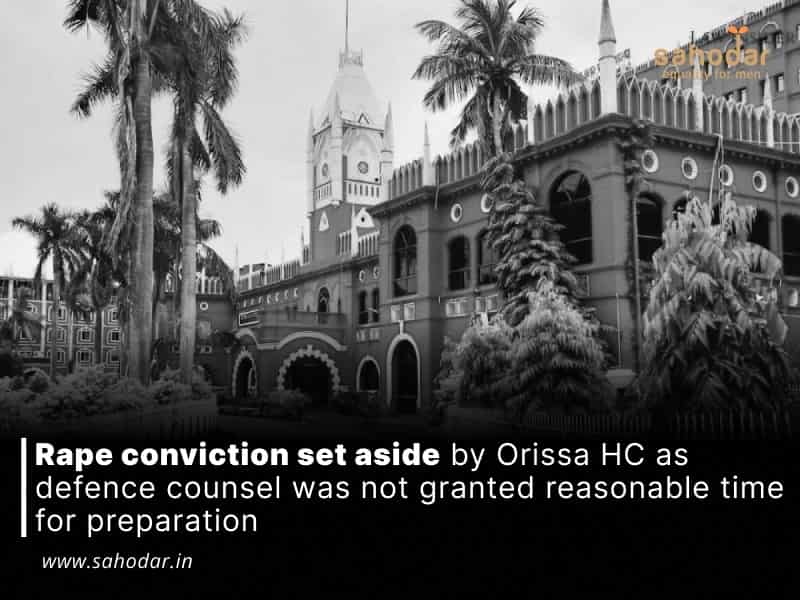The Orissa High Court has overturned the conviction and sentence of a rape accused because the State Defence Counsel, who represented him in the Trial Court, did not receive the necessary police papers and preparation time to cross-examine the victim. The Single Judge Bench of Justice Sangam Kumar Sahoo criticized the rushed cross-examination process and stated that the accused was unfairly disadvantaged by the trial court’s actions. The judge also emphasized that a criminal trial should not be treated like an IPL T20 match where every substitute player can make a significant impact.
The appellant was tried in the Court of 3rd Additional Sessions Judge, Balasore for the crime of rape under Section 376(2)(l) of the IPC. The accusation was that, being a relative of the son-in-law of the informant, he committed rape on the informant’s disabled daughter. The Trial Court found him guilty and sentenced him to ten years of rigorous imprisonment along with a fine of Rs. 5,000, and one additional year of imprisonment in default of paying the fine. The appellant was not content with the verdict and decided to file an appeal with the High Court.
The appellant argued that he was severely prejudiced by the Trial Court’s engagement of a new State Defence Counsel (SDC) on the same day the victim was examined, without providing him with the necessary police papers. Additionally, the Trial Court pressured the SDC to complete the cross-examination of the victim on the same day after merely reviewing the case record. The appellant contended that the SDC did not have sufficient time to prepare and interact with him to fully prepare for the case. As a result, the SDC only asked a few questions during cross-examination and closed it under Trial Court pressure. Therefore, the appellant requested the Court to nullify the conviction and return the matter for a new trial.
Observation of the court
The Court reviewed the Trial Court’s order-sheets and discovered that the Addl. Public Prosecutor submitted a petition on April 11, 2019, requesting the appointment of the victim’s disabled father as an interpreter to assist in decoding her evidence. The SDC received a copy of the petition, but was only given 50 minutes to file an objection. When the SDC requested additional time to file an objection, the Trial Court denied the request, stating that the victim had already appeared in court several times. As a result, the SDC left the courtroom and did not participate in the recording of the victim’s evidence. Another counsel was appointed from the list of State Defence Counsel to review the case records immediately.
Upon inspecting the case records, the newly appointed counsel gave his consent to complete the victim’s cross-examination on the same day with the assistance of her father as the interpreter. The victim was discharged after her evidence was recorded. However, after reviewing the Trial Court’s order-sheets, the Court determined that the Judge had already decided to complete the recording of the victim’s evidence on that day. Although it was noted that the victim had previously appeared in court several times, there was no mention of this in the order-sheets of the previous dates.
Justice Sahoo expressed serious dissatisfaction with the rushed manner in which the cross-examination was conducted and completed that day. He emphasized that the engagement of the State Defence Counsel should not be a mere formality or compliance with legal provisions, but rather a sincere effort to conduct the case of the accused with full intent and purpose.
According to Justice Sahoo, the Constitution guarantees not only the right to be heard before being condemned, but also the right to a fair, just, and reasonable opportunity to be heard. If the State defence counsel appointed for an accused is unnecessary and there is a real contest, the right to a fair trial is violated. The Court has a duty to provide all relevant documents to the State defence counsel and to give them adequate time to prepare the defence. Otherwise, the defence would be meaningless and not serve its true purpose. The Court referred to the guidelines issued by the Supreme Court in Anokhilal v. State of Madhya Pradesh, which set out the proper representation of accused persons in Courts in accordance with Articles 39-A and 21 of the Constitution.
The Court stressed that the representation of the accused by a pleader under Section 304(1) of CrPC should not be merely superficial, but rather genuine and diligent. Failing to provide adequate representation would not absolve the State of its responsibilities under the law and would not meet the requirements of fairness under Articles 14 and 21 of the Constitution. The Court found that the State Defence Counsel was not given enough time and materials to prepare adequately for the case, including cross-examining the victim, and therefore the appellant’s conviction under Section 376(2)(l) of the IPC was quashed. The case was remanded back to the Trial Court for a fresh trial, starting from the cross-examination stage.
Source: https://www.livelaw.in/news-updates/orissa-high-court-rape-conviction-crossexamination-of-victim-right-to-fair-hearing-recording-of-evidence-defense-counsel-225519

